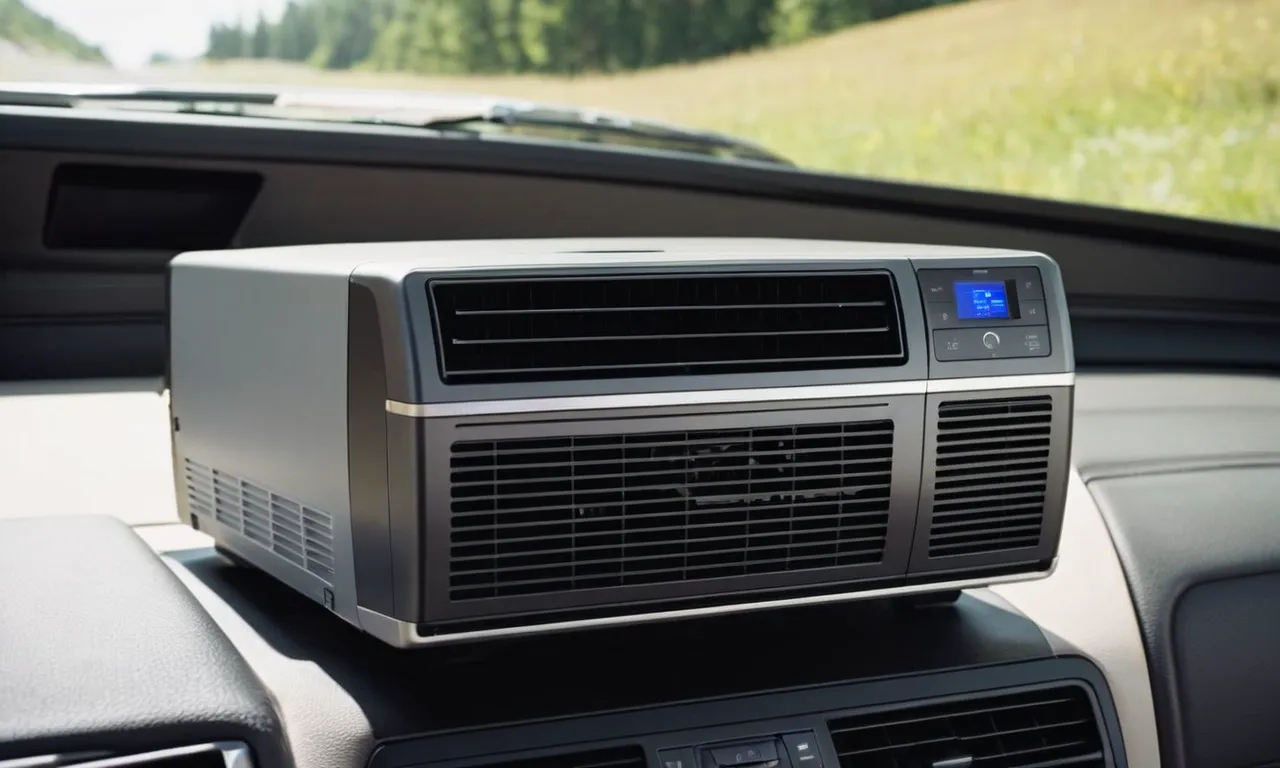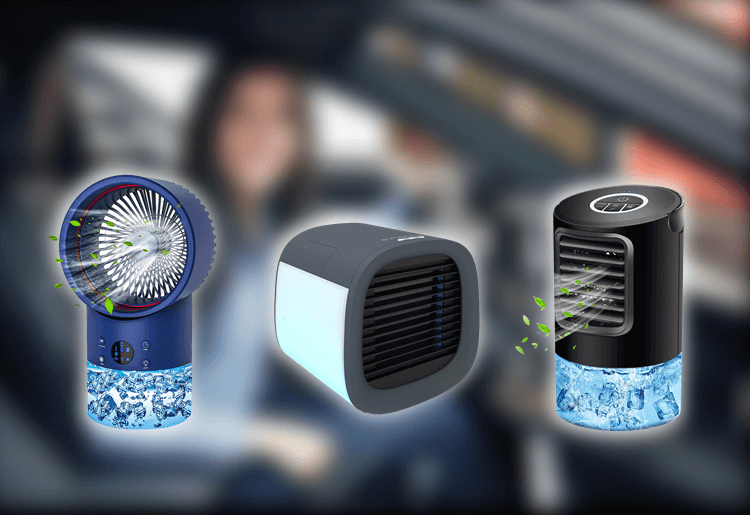Portable Air Conditioning Units For Cars

Staying cool in your car doesn't always mean blasting the factory AC, which can significantly impact fuel efficiency. For those looking for alternative and potentially more energy-conscious options, portable air conditioning units for cars are gaining traction. This article explores the world of personal car AC units, examining their effectiveness, energy consumption, cost, and integration possibilities with smart home energy management.
Understanding Portable Car AC Units: Beyond the Standard
Traditional car air conditioning systems rely on the vehicle's engine to power a compressor that circulates refrigerant. This process can be energy-intensive, reducing fuel economy by as much as 20%, according to the Environmental Protection Agency (EPA). Portable car AC units, on the other hand, often use alternative cooling methods and can be powered by the car's 12V outlet or even batteries, offering a potentially less demanding alternative.
Types of Portable Car AC Units
The market offers several types of portable car AC units, each with its own pros and cons:
- Evaporative Coolers (Swamp Coolers): These units use the principle of evaporative cooling, where water evaporates and absorbs heat from the air. They are generally the most energy-efficient option, but their effectiveness is limited in humid environments. They work best in dry climates where humidity is low.
- Thermoelectric Coolers (Peltier Coolers): These coolers use the Peltier effect to transfer heat from one side of a semiconductor to the other. They are compact and don't require refrigerant, but they are typically less powerful than evaporative coolers and may draw more power. They are often used for personal cooling, such as desktop units.
- Compressor-Based Portable AC Units: Similar to traditional car ACs, these units use a compressor and refrigerant. They offer the strongest cooling performance but are generally larger, more expensive, and require more power than other types. Some compressor-based units are designed with inverters to optimize energy usage.
Energy Consumption and Cost-Effectiveness
The energy consumption of a portable car AC unit is a critical factor to consider. Evaporative coolers typically consume the least amount of power, often drawing only a few amps from a 12V outlet. Thermoelectric coolers consume more power, while compressor-based units can draw a significant amount of power, potentially straining the car's electrical system if not used carefully. Look for Energy Star ratings or similar certifications when available to assess energy efficiency.
Calculating the ROI (Return on Investment) involves comparing the cost of the unit with the potential fuel savings and the convenience it offers. For example, if a driver typically spends $50 per month on fuel and reduces fuel consumption by 10% by using a portable AC unit instead of the factory AC, the monthly savings would be $5. Over a year, this amounts to $60. If the portable AC unit costs $150, the payback period would be 2.5 years.
Data Points to Consider:
- Power Consumption: Check the wattage or amperage of the unit. Lower wattage generally means lower energy consumption.
- Cooling Capacity: Measured in BTU (British Thermal Units), a higher BTU rating indicates stronger cooling power. However, a higher BTU rating also typically means higher energy consumption.
- Climate: Evaporative coolers are most effective in dry climates, while compressor-based units are better suited for humid environments.
Integration with Smart Home Energy Management
While directly integrating portable car AC units into a smart home system is not typical, there are indirect ways to leverage smart home technology for better energy management related to vehicle use. For example:
- Smart Thermostats: Preheat or precool your home before you arrive using a smart thermostat, minimizing the need to run the car AC at full blast during commutes.
- Energy Monitoring Systems: Track your car's fuel consumption and driving habits using smart driving apps or OBD-II scanners. This data can help you identify areas where you can reduce energy waste, such as idling or aggressive driving.
- Smart Plugs: If your portable car AC unit can be plugged into a standard outlet (e.g., for charging), you can use a smart plug to schedule its operation or monitor its energy consumption.
The rise of electric vehicles (EVs) introduces another layer of integration. Smart charging stations can optimize charging schedules to coincide with off-peak electricity rates, further reducing energy costs. Furthermore, some EVs offer preconditioning features that allow you to heat or cool the cabin remotely, minimizing the need for the car AC during the initial part of your drive.
Installation and Maintenance
Most portable car AC units are designed for easy installation. Evaporative and thermoelectric coolers typically require only plugging into the car's 12V outlet and, in the case of evaporative coolers, filling the water reservoir. Compressor-based units may require more complex installation, such as venting the hot air out of the window using a hose.
Maintenance requirements vary depending on the type of unit. Evaporative coolers require regular cleaning to prevent mold and mildew growth. Thermoelectric coolers may require occasional cleaning of the heat sinks. Compressor-based units may require professional servicing if refrigerant leaks or compressor issues arise.
Tips for Optimal Performance:
- Park in the Shade: This reduces the heat load on the car and improves the effectiveness of the portable AC unit.
- Use Window Shades: Reflect sunlight to further reduce heat buildup inside the car.
- Ventilate the Car: Before turning on the portable AC unit, open the windows briefly to allow hot air to escape.
- Keep the Unit Clean: Regular cleaning ensures optimal performance and prevents the growth of mold and bacteria.
Government Guidelines and Rebates
While there are no specific government guidelines or rebates directly targeting portable car AC units, some states or municipalities may offer rebates for energy-efficient appliances in general. It's worth checking with your local utility company or energy efficiency program to see if any incentives are available. Additionally, many states offer tax credits or rebates for the purchase of electric vehicles, which can indirectly reduce your reliance on car ACs by providing preconditioning features and more efficient cooling systems.
Always refer to the manufacturer's instructions and safety guidelines when using portable car AC units. Improper use can lead to electrical hazards or damage to the car's electrical system.
HVAC Contractor Opportunities
For HVAC contractors, the growing interest in energy-efficient car cooling solutions presents new opportunities. Contractors can offer:
- Consultation Services: Help customers assess their car cooling needs and recommend the most suitable portable AC unit based on their climate, driving habits, and budget.
- Installation Services: Install compressor-based portable AC units or other units that require more complex installation.
- Maintenance and Repair Services: Provide maintenance and repair services for portable car AC units, particularly compressor-based models.
- Integration with Smart Home Systems: Advise customers on how to integrate portable car AC units with their smart home energy management systems for better overall energy efficiency.
Contractors can also partner with retailers to offer bundled packages of portable car AC units and energy-efficient car accessories, such as window shades and solar-powered chargers.
Conclusion: A Breath of Fresh Air for Energy-Conscious Drivers
Portable air conditioning units for cars offer a viable alternative to traditional car AC systems for those seeking to reduce energy consumption and lower fuel costs. While not always as powerful as factory-installed systems, they can provide effective cooling, especially in specific climates. By understanding the different types of units, considering energy consumption data, and exploring integration possibilities with smart home technology, drivers can make informed decisions and enjoy a cooler, more energy-efficient driving experience. As technology advances and consumer demand for sustainable solutions grows, the market for portable car AC units is likely to expand, offering even more innovative and energy-efficient options in the future.










